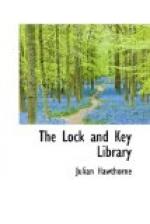While the execution was still proceeding, Bob sat up upon the floor.
“Hollo!” he asked, “what’s happened?”
“We’ve emptied the bottle, Bob,” said Tress. “But there’s another where that came from. Perhaps you could drink another tumblerful, my boy?”
Bob drank it!
FOOTNOTE
“Those gentry are hard
to kill.” Here is fact, not fantasy.
Lizard yarns no less sensational
than this Mystery Story can be
found between the covers of
solemn, zoological textbooks.
Reptiles, indeed, are far from finicky in the matters of air, space, and especially warmth. Frogs and other such sluggish-blooded creatures have lived after being frozen fast in ice. Their blood is little warmer than air or water, enjoying no extra casing of fur or feathers.
Air and food seem held in light esteem by lizards. Their blood need not be highly oxygenated; it nourishes just as well when impure. In temperate climes lizards lie torpid and buried all winter; some species of the tropic deserts sleep peacefully all summer. Their anatomy includes no means for the continuous introduction and expulsion of air; reptilian lungs are little more than closed sacs, without cell structure.
If any further zoological fact were needed to verify the denouement of “The Pipe,” it might be the general statement that lizards are abnormal brutes anyhow. Consider the chameleons of unsettled hue. And what is one to think of an animal which, when captured by the tail, is able to make its escape by willfully shuffling off that appendage?—EDITOR.
The Puzzle
I
Pugh came into my room holding something wrapped in a piece of brown paper.
“Tress, I have brought you something on which you may exercise your ingenuity.” He began, with exasperating deliberation, to untie the string which bound his parcel; he is one of those persons who would not cut a knot to save their lives. The process occupied him the better part of a quarter of an hour. Then he held out the contents of the paper.
“What do you think of that?” he asked. I thought nothing of it, and I told him so. “I was prepared for that confession. I have noticed, Tress, that you generally do think nothing of an article which really deserves the attention of a truly thoughtful mind. Possibly, as you think so little of it, you will be able to solve the puzzle.”
I took what he held out to me. It was an oblong box, perhaps seven inches long by three inches broad.
“Where’s the puzzle?” I asked.
“If you will examine the lid of the box, you will see.”
I turned it over and over; it was difficult to see which was the lid. Then I perceived that on one side were printed these words:
“PUZZLE: TO OPEN THE BOX”




